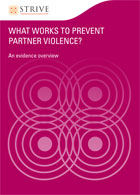New report on intimate partner violence and alcohol use
A new evidence overview points at excessive alcohol consumption as one the key drivers behind intimate partner violence. The report is written by senior lecturer Lori Heise at the London School of Hygiene and Tropical Medicine.
The title of the new report is “What works to prevent partner violence: An evidence overview”. In the Executive summary Lori Heise calls for a shift in focus in strategies to prevent intimate partner violence: “The review focuses on efforts to prevent partner violence, rather than evaluating services that are available for victims. In focusing on prevention rather than mitigation or response, the review concentrates on interventions designed to reduce the overall level of violence in the medium to long term, rather than on interventions to meet the immediate needs of victims. This shifts the focus of inquiry away from interventions designed to improve services towards programmes and policies designed to influence the underlying determinants of partner violence”.
The report can be downloaded from the STRIVE web site here.
 Lori Heise’s report is produced as part of the so-called STRIVE Research Consortium; a research program that focuses on tackling the structural drivers of HIV. See more information on STRIVE here and here. Lori Heise (picture to the right) is the Chief Executive of STRIVE, based at the London School of Hygiene and Tropical Medicine. Her study on intimate partner violence is funded by UKaid from the Department for International Development (DFID).
Lori Heise’s report is produced as part of the so-called STRIVE Research Consortium; a research program that focuses on tackling the structural drivers of HIV. See more information on STRIVE here and here. Lori Heise (picture to the right) is the Chief Executive of STRIVE, based at the London School of Hygiene and Tropical Medicine. Her study on intimate partner violence is funded by UKaid from the Department for International Development (DFID).
The bulk of the report consists of six substantive thematic chapters. The first three topics are gender-related norms, including notions of masculinity and female subordination, exposure to violence during childhood and male alcohol abuse. “These were chosen because there is relatively strong evidence that these factors are contributing causes of partner violence. The practical implication is that interventions that successfully reduce these factors among individuals or in communities will also reduce the prevalence and severity of women’s experience with partner violence”, says the author.
In chapter 4 the review establishes excessive alcohol use, especially binge drinking, as a key factor that increases the frequency and severity of partner violence: “Excessive drinking by men has been strongly associated with partner violence in nearly every setting that has been studied. While alcohol use is neither necessary nor sufficient for abuse to occur, data suggest that lowering the rates of binge drinking could reduce the overall level and severity of partner violence.
 Various strategies have been demonstrated effective in reducing the harmful consequences of drinking. These include brief counseling interventions implemented by health workers; self-help support groups such as Alcoholics Anonymous; and reducing the general availability of alcohol by increasing taxation, passing and enforcing laws restricting sale and purchase, and regulating the density of outlets where alcohol can be obtained.
Various strategies have been demonstrated effective in reducing the harmful consequences of drinking. These include brief counseling interventions implemented by health workers; self-help support groups such as Alcoholics Anonymous; and reducing the general availability of alcohol by increasing taxation, passing and enforcing laws restricting sale and purchase, and regulating the density of outlets where alcohol can be obtained.
Studies have demonstrated a reduction in domestic violence after the implementation of strategies to reduce alcohol availability in the United States, Greenland, and Australia, as well as reduction of violence after abusers have been treated for alcohol abuse. Replication of the “brief counselling” intervention by health workers has shown promise in South Africa and India; however, evaluated programmes, especially those that specify partner violence as an outcome, are rare in the developing world.”
RELATED ARTICLES
- New report highlights benefits of policy measures to prevent harmful alcohol consumption
- Highlighting the COVID-19 – alcohol connection
- Alcohol among risk factors increasing
- WHO Launches Global status report on alcohol and health 2018
- Effective alcohol policies are needed now to yield health benefits in the future
- New publication on violence and alcohol
- Intervention gives reduced drinking, aggression and violence
- Powerful reminders of the many real effects of alcohol consumption
- Alcohol use a significant cancer risk factor
- MenEngage Alliance established in Sri Lanka

